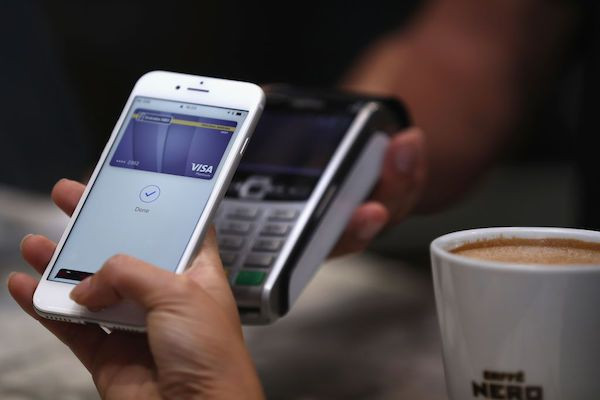US Adoption Of Mobile Payments Still Lackluster

Once heralded as a leap forward in convenience and security, adoption of mobile payment services in the U.S. is still relatively underwhelming compared to other countries, even as the U.S. boasts high levels of smartphone adoption. Apple (NASDAQ:AAPL) is hoping that its new Apple Card can help nudge adoption higher, offering a higher rewards rate of 2% cash back for purchases made using Apple Pay, compared to the standard 1% cash back when using the titanium card. Alphabet (NASDAQ:GOOG) (NASDAQ:GOOGL) subsidiary Google rebranded its service as Google Pay in early 2018, combining Google Wallet and Android Pay.
Here's why America has been slow to jump on the mobile payments bandwagon.
Apple Pay adoption in the U.S. is just 9%
CNBC reports that mobile payments adoption in the U.S. remains under 10%, according to recent estimates from Bain. One key reason is that mobile payments are only negligibly more convenient than using regular credit or debit cards. Swiping a plastic card is already incredibly fast, and in some cases can be even easier than using Apple Pay, which requires the user to authenticate with Face ID or Touch ID and confirm the transaction with several button presses.
The credit card ecosystem in the U.S. is very mature with 80% adoption. Outside of traditional payment methods, PayPal (NASDAQ:PYPL) enjoys strong adoption of 44%. At 9%, Apple Pay does have the highest adoption rate among mobile payment services, but that level of usage is still less than ideal. PayPal's Venmo comes in second among mobile payment offerings at 7%, with Zelle and Google offerings each at 6%, according to the report.
"Based on June quarter performance, Apple Pay is now adding more new users than PayPal, and monthly transaction volume is growing four times as fast," Apple CEO Tim Cook bragged a month ago. That's somewhat of a specious comparison, though, as PayPal has been around for two decades and Apple Pay is growing off an extremely small user base. Apple Pay now conducts 1 billion transactions per month, Cook added.
Other countries that are seeing higher rates of mobile payment adoption, such as China and India, are coming from cash-based economies, according to Bain. Mobile payments do represent a significant improvement in convenience and security over cash. India has been waging a war on cash in recent years, while Chinese tech giants like Tencent and Alibaba have made their respective mobile payment services the preferred payment methods among consumers.
Additionally, Americans love credit card rewards programs, and mobile payment services aren't as generous. While Apple Card offers 2% on Apple Pay transactions, Goldman Sachs estimates that most users will end up earning close to 1% cash back on average from using the physical card.
The opportunity for Apple Pay in the U.S. might not be that great, which is why the company has been aggressively expanding in other countries. The tech giant launched Apple Pay in 17 countries last quarter, bringing its total to 47 markets.
Suzanne Frey, an executive at Alphabet, is a member of The Motley Fool's board of directors. Evan Niu, CFA owns shares of BABA, Apple, and TCEHY. The Motley Fool owns shares of and recommends Alphabet (A shares), Alphabet (C shares), Apple, PayPal Holdings, and TCEHY. The Motley Fool has the following options: short October 2019 $97 calls on PayPal Holdings, short January 2020 $155 calls on Apple, and long January 2020 $150 calls on Apple. The Motley Fool has a disclosure policy. This article originally appeared in the Motley Fool.




















